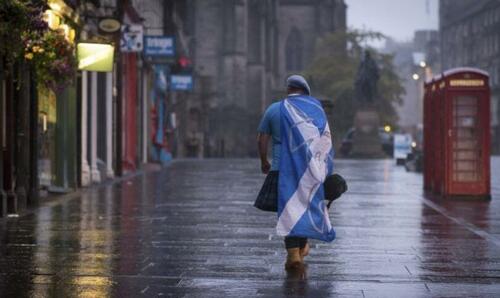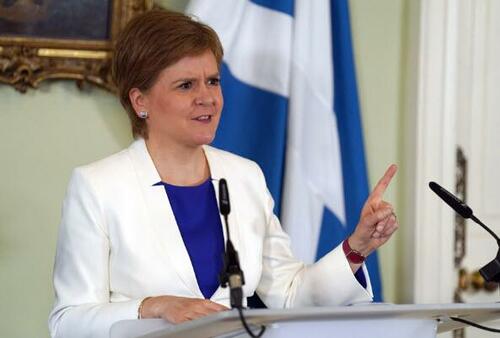
Authored by Rachel Hannah via The Epoch Times,
Nicola Sturgeon’s shock departure from office and from Scottish politics has left supporters and opponents alike reeling - and also wondering where this leaves the campaigns for and against independence.
Pro-independence supporter, the journalist, Lesley Riddoch, suggested Unionist opponents were heaping praise on the outgoing Sturgeon to try and signal the campaign for independence was finished without her:
“Let’s not be fooled … the unionists come to praise Nicola Sturgeon and bury independence. No one is stupid enough to be dancing on her grave. They’re dancing on the grave of independence.”
It was “a bit of a backhanded compliment” in the acknowledgement of the big role she had played but was being used as “a weight to sink the cause of independence,” Riddoch suggests.
An exhausted Riddoch - who had already done 24 other interviews - told The Epoch Times the departing First Minister was “a woman who looked a bit like superwoman … like a political shock absorber … who just seemed to be able to take every massive obstacle thrown her way.”
Scottish Tory leader Douglas Ross accused Sturgeon of presiding over ten years of constitutional paralysis in pushing for independence despite losing the 2014 referendum.
Looming ‘De Facto’ Referendum
But Riddoch, who believes the terms of reference of the 2014 referendum have been changed by Brexit, suggests the “changing of the guard” presented an opportunity to reinvigorate the campaign with fresh—and potentially younger—blood.
There is now likely to be a pause in which key figures decide what direction that will take at the political level.
Senior figures in the governing Scottish National Party (SNP) must now determine whether to hold the special conference scheduled for next month.
First Minister Nicola Sturgeon speaks at a press conference to launch a second independence paper at Bute House in Edinburgh, Scotland, on July 14, 2022. (Andrew Milligan – Pool/Getty Images)
Following the Supreme Court’s decision not to allow a fresh referendum without UK government approval, Sturgeon announced the “Special Democracy Conference.”
Currently slated for March 19, the event was to allow party members to debate the pivotal question on whether the UK general election next year should be framed as a “de facto” referendum.
This was Sturgeon’s proposition but there was resistance within her party including from its new leader in Westminster Stephen Flynn.
Sturgeon pointed to differences of opinion over a “de facto” referendum as one factor in her decision to step aside to make way for a new leader to set out their own path.
Ruling out running himself to replace Sturgeon, Flynn told the BBC the SNP should give her successor the chance to set out their own agenda, suggesting to Sky News the special conference could be postponed.
The timetable for the leadership election has not yet been announced, but the process could deliver a new leader for the party— and for Scotland before or during the conference.
In her resignation speech from Bute House in Edinburgh, Sturgeon also alluded to recent controversies around gender rights legislation and expressed concern that she was herself becoming a distraction not a facilitator to the independence cause.
She told reporters: “I feel more each day just now that the fixed opinions people increasingly have about me—as I say, some fair, others little more than caricature—are becoming a barrier to reasoned debate.”
Hailed in valedictory homage as “formidable” by opponents, the 52-year-old Sturgeon was a “giant” whose departure would be “a huge loss to democracy and decency in politics,” Scottish media expert Robert Beveridge told The Epoch Times.
“Humane, hard-working, and competent,” Sturgeon would be” hard to replace,” Beveridge said paying tribute, adding “we only know what is gone and what we have lost when it is gone.”
Pamela Nash from the campaign organisation Scotland in Union, based in Glasgow, which opposes independence, said Sturgeon would be remembered as a “formidable political operator.”
But Nash said Sturgeon was leaving at a time when “we are all suffering from the consequences of her choice to concentrate on dividing our country, at the expense of the day job.”
Nash said research showed that voters wanted the Scottish government to concentrate on issues like the NHS, education, the economy, and addressing the cost-of-living crisis, not independence.
...
Michael Brooke, a member of the Better Together campaign that opposed independence in the 2014 referendum, told The Epoch Times there was “relief” among unionists that Sturgeon had gone “as long as her departure doesn’t create a political vacuum opening the way to someone more dangerous to the unity of this island nation.”
He expressed the hope the next SNP leader would not be more “divisive,” adding: “If you got a rampant separatist I think it will do more damage.
“But if you’ve got someone who is, perhaps, a little more sensible, who can look at what other people are thinking and not just being introspective, it could do the cause some good I would have thought if it was Scottish ‘nationalism’ within a UK framework.
“But if it is someone more radical even than Nicola Sturgeon then I worry about the future of the Union.”
...
Authored by Rachel Hannah via The Epoch Times,
Nicola Sturgeon’s shock departure from office and from Scottish politics has left supporters and opponents alike reeling – and also wondering where this leaves the campaigns for and against independence.
Pro-independence supporter, the journalist, Lesley Riddoch, suggested Unionist opponents were heaping praise on the outgoing Sturgeon to try and signal the campaign for independence was finished without her:
“Let’s not be fooled … the unionists come to praise Nicola Sturgeon and bury independence. No one is stupid enough to be dancing on her grave. They’re dancing on the grave of independence.”
It was “a bit of a backhanded compliment” in the acknowledgement of the big role she had played but was being used as “a weight to sink the cause of independence,” Riddoch suggests.
An exhausted Riddoch – who had already done 24 other interviews – told The Epoch Times the departing First Minister was “a woman who looked a bit like superwoman … like a political shock absorber … who just seemed to be able to take every massive obstacle thrown her way.”
Scottish Tory leader Douglas Ross accused Sturgeon of presiding over ten years of constitutional paralysis in pushing for independence despite losing the 2014 referendum.
Looming ‘De Facto’ Referendum
But Riddoch, who believes the terms of reference of the 2014 referendum have been changed by Brexit, suggests the “changing of the guard” presented an opportunity to reinvigorate the campaign with fresh—and potentially younger—blood.
There is now likely to be a pause in which key figures decide what direction that will take at the political level.
Senior figures in the governing Scottish National Party (SNP) must now determine whether to hold the special conference scheduled for next month.
First Minister Nicola Sturgeon speaks at a press conference to launch a second independence paper at Bute House in Edinburgh, Scotland, on July 14, 2022. (Andrew Milligan – Pool/Getty Images)
Following the Supreme Court’s decision not to allow a fresh referendum without UK government approval, Sturgeon announced the “Special Democracy Conference.”
Currently slated for March 19, the event was to allow party members to debate the pivotal question on whether the UK general election next year should be framed as a “de facto” referendum.
This was Sturgeon’s proposition but there was resistance within her party including from its new leader in Westminster Stephen Flynn.
Sturgeon pointed to differences of opinion over a “de facto” referendum as one factor in her decision to step aside to make way for a new leader to set out their own path.
Ruling out running himself to replace Sturgeon, Flynn told the BBC the SNP should give her successor the chance to set out their own agenda, suggesting to Sky News the special conference could be postponed.
The timetable for the leadership election has not yet been announced, but the process could deliver a new leader for the party— and for Scotland before or during the conference.
In her resignation speech from Bute House in Edinburgh, Sturgeon also alluded to recent controversies around gender rights legislation and expressed concern that she was herself becoming a distraction not a facilitator to the independence cause.
She told reporters: “I feel more each day just now that the fixed opinions people increasingly have about me—as I say, some fair, others little more than caricature—are becoming a barrier to reasoned debate.”
Hailed in valedictory homage as “formidable” by opponents, the 52-year-old Sturgeon was a “giant” whose departure would be “a huge loss to democracy and decency in politics,” Scottish media expert Robert Beveridge told The Epoch Times.
“Humane, hard-working, and competent,” Sturgeon would be” hard to replace,” Beveridge said paying tribute, adding “we only know what is gone and what we have lost when it is gone.”
Pamela Nash from the campaign organisation Scotland in Union, based in Glasgow, which opposes independence, said Sturgeon would be remembered as a “formidable political operator.”
But Nash said Sturgeon was leaving at a time when “we are all suffering from the consequences of her choice to concentrate on dividing our country, at the expense of the day job.”
Nash said research showed that voters wanted the Scottish government to concentrate on issues like the NHS, education, the economy, and addressing the cost-of-living crisis, not independence.
…
Michael Brooke, a member of the Better Together campaign that opposed independence in the 2014 referendum, told The Epoch Times there was “relief” among unionists that Sturgeon had gone “as long as her departure doesn’t create a political vacuum opening the way to someone more dangerous to the unity of this island nation.”
He expressed the hope the next SNP leader would not be more “divisive,” adding: “If you got a rampant separatist I think it will do more damage.
“But if you’ve got someone who is, perhaps, a little more sensible, who can look at what other people are thinking and not just being introspective, it could do the cause some good I would have thought if it was Scottish ‘nationalism’ within a UK framework.
“But if it is someone more radical even than Nicola Sturgeon then I worry about the future of the Union.”
…
Loading…








